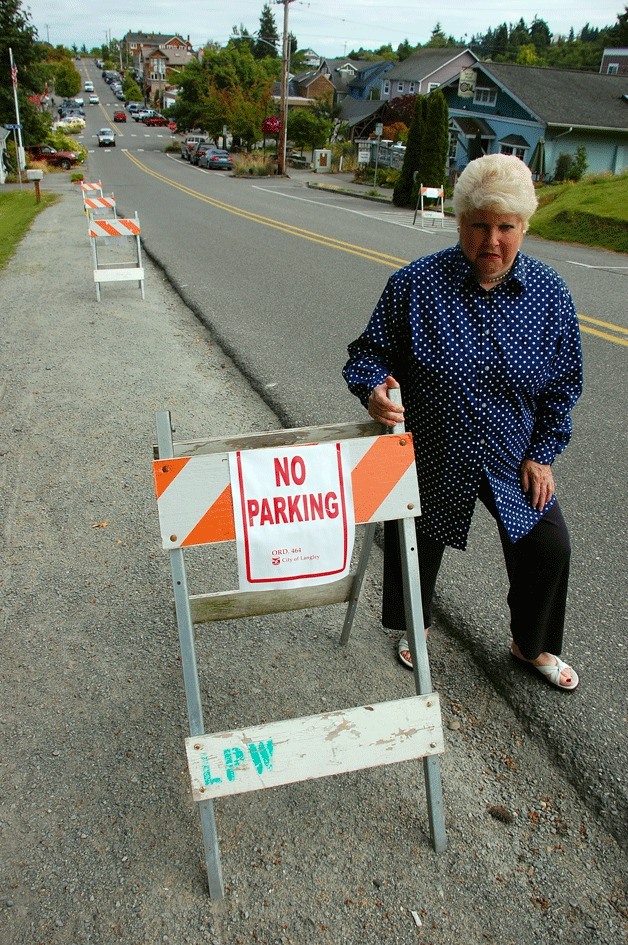Parking changes coming down from Langley City Hall are once again causing a fuss on Second Street.
Last week, the gravel parking along the north side of the road, between Anthes and Park Avenue, was temporarily closed to address problems from storm water. Although the issue was discussed at a July City Council meeting, Mo’s Pub & Eatery owner Maureen Cooke said she was not informed.
She learned of the closure by showing up for work on Wednesday to find a series of “no parking” signs posted in spots that had been utilized by her customers the day before. The move came just weeks after the city approved a new parking zone on the same block that requires permits after 4 p.m.
“They’ve taken the whole street away,” Cooke said.
This is one of her busiest times of the year and the loss of parking has been hard on her business. During the first week of the closure, Cooke said she saw her sales receipts tumble “a whopping 28 percent.”
Although customers have begun to adjust and are now utilizing parking along Anthes and at U.S. Bank and the Langley Methodist church, Cooke is worried about her elderly customers and questions the logic behind the closure.
“I just find it ludicrous and absurd,” she said.
According to Challis Stringer, director of Public Works, the gravel parking area is in a public right of way and was closed largely to address what was becoming a pricey storm water problem.
Because the area is located on a hill, heavy rains cause the gravel covering the parking spots to wash into a nearby drain. A recent inspection found the underground pipe choked with rock and sediment, she said.
“It’s completely compacted with gravel,” she said.
Having a professional clean out the pipe costs about $1,500. This has been an ongoing problem for years, she said, and the city can’t afford to pay for continued cleanings every time the drain gets clogged.
There is currently no money to pave the area, so city officials are hoping grass will serve as a stopgap. The area has been sprinkled with seed and it should take about six weeks for it to mature, Stringer said.
At that time, the parking area will be reopened. However, if it doesn’t work and the area becomes muddy and causes further clogs, Stringer said the city will have to take further action.
“If it gets torn up, we’ll close it permanently,” she said.
Or, at least until money can be found to pave the area. It’s unclear when those funds might be available.
Pub owner Cooke isn’t buying it. Along with the recent implementation of the permit-parking zone, she can’t help but start to feel like she’s being picked on.
“It’s been one thing after another since we opened last year,” Cooke said.
“We’re taking it as harassment,” she said.
This is a terrible time of year to lose parking and Cooke is calling on city officials to find a way to mitigate the problem.
“Right smack in the middle of summer is just not right,” Cooke said. “There has to be some kind of compromise.”
Mayor Larry Kwarsick emphasized that no one at City Hall has it out for the pub. On the contrary, he said it attracts a host of customers and is a valuable business that adds to the city.
However, as an evening enterprise, its location in a largely residential area makes for some tricky problems. He said the permit-parking zone has been in the works for a long time and is an attempt to balance business and residential concerns.
As for the gravel parking, he said that’s a temporary problem and hopes the issue will be resolved soon. He said the city is willing to compromise by allowing some commercial parking in the permit areas but only after property owners are notified and only until permanent parking signs can be installed.
He made it clear that they could arrive “any day” so the mitigation may be extremely short lived. He also noted that, as Cooke pointed out, people are starting to adjust. The problem is already beginning to sort itself out.
“We’re glad people are adapting,” Kwarsick said. “We’re willing to adapt but we also need to stay the course.”




